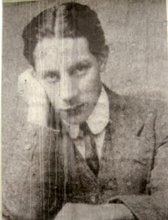Chosen and Translated
By
Rosa Peñaloza de Siluk And Dennis L. Siluk Dr. h.c.
With Introduction, Commentaries
Biography and Editing by Dennis L. Siluk
(Author's forthcoming book: "Jatunmayo..."
(The Mantaro Valley)
The Poetry of: Dennis L. Siluk Dr. h.c.
and ‘The Translated Poetry of Juan Parra del Riego’
(Translated from the Spanish into English
by Rosa Peñaloza de Siluk, and Edited by Dennis L. Siluk-Poet Laureate)
First Time Ever Translated Spanish into English
Introductions
By Dennis L. Siluk and Rosa Peñaloza de Siluk
Juan Parra del Riego, is an authentic poet with deep feeling. He does not hide the difficult parts of his life, which are often full of despair, and dim lights, he describes it with love and paces rapidly to and fro, the master of Polirritmo in the time of Modernism in poetry (1914 to 1965).There is tenderness, rowdiness, hunger, restlessness, and compassion for life in his poetry (he was dying when writing much of his poetry, and lived only until his 31st Birthday). Born in Huancayo, Peru, he eventually moved to Uruguay, where he started his own movement. He visited Paris once and had to borrow money to get back home, like most poets of their times, he died a pauper. His poetry must be explored more so than simply read, it has a delicate balance to it, a lively spirit inside of it, and the author never seems quite content. Dlsiluk
About my husband, Dennis L. Siluk, he was awarded Diploma of Recognition by Los Andes Peruvian University, in Huancayo, Peru for outstanding literary achievement and promoting the culture of the Mantaro Valley (12/2006); Awarded a Diploma of Honor by “The College of Journalists of Peru “for his (poetic) writings and contributions; Awarded a certificate of recognition by the University National Center Peru for his contribution to the Education and Culture of the Mantaro Valley (2007). Dennis was also the winter of two columnists’ awards (2004, 2005), and awarded the English Magazines top story of the month (October, 2006). And most recently his poetry was published in the anthology of Peruvian Poets, “Literaturea de Junin Siglo XX” by Apolinario Mayta Inga.
I brought my husband to the Mantaro Valley five years ago, and he fell in live with it, and hearing of Juan Parra del Riego, he wanted to read his poetry, but it was all in Spanish, never translated, thus he and I started to translated it, sometimes spending many hours (each) on just one poem (morning and nights) to insure we got the correct meaning in English, imagery (and or symbolism), and content (for as my husband said, “He uses a lot of figurative meanings”), or at least the closest one could get. He found Juan Parra’s poetry to be quite interesting, and had told me he enjoyed it much more than Cesar Vallejo’s, all respect intended.
By Rosa Peñaloza de Siluk
Carlos Parra del Riego, one more brother to Juan Parra del Riego, was also a poet in his own right, and like his older brother Juan, died also tuberculosis. He got his illness in Argentina, and in 1936, came back to Huancayo, Peru for a cure. He lived here in Huancayo for another three years and died (also lived part time in Jauja). He was hospitalized most of the time. His writings, “Why I killed the child,” and “Romantic Serenade,” both done in prose style poetry.
Thoughts and Notes on Juan Parra del Riego
1—It should be noted, Cesar Vallejo was 45-years old when he died, and Juan Parra del Riego was 31; Vallejo born 1893, died 1938, and Riego born 1894, died 1925, both were friends. One year apart in age. ´Both Great poets, but for my money would take Juan Parra before Vallejo; he is the greatest modern poet in Uruguay, and not quite that well known in Peru, although Huancayo, where he was born he is clearly a name recognized.
2—To my knowledge one has yet to write a full biography of Riego in English, the contents in this book (and on a site I created for him on the internet in English and Spanish) is the closest thing to one; with some poems, background, sketches, photos of himself and his brothers, and so forth, some external facts to guide us through his life, is the closest thing thus far written on him in over a half century, and the only one in English., ever.
3—We know like Vallejo, Juan went to Paris, and had to borrow money to get back home, thus, he ended up poor, as most poets do, a few exceptions who have received inheritances to help them make it through life.
4—Some reader may ask, ‘Just what can we learn from this Peruvian poet?” This would in itself give justification for publishing, editing, and translating his poetry and background. I mean it was no easy task to do. First of all, scarcely does anyone know the existence of this great poet in North America, or Europe. As they didn’t know about Vallejo, until Robert Bly (North American Poet) translated his works in 1962. I have tried to bring this poet stamina and imagination to bear on the hunger and pain he faced, while writing his poetry, for he was dying during the process, thus we see a different kind of reality here. We see his inner world, almost his soul; this is why I think he is an import poet. Dlsiluk
Subscribe to:
Post Comments (Atom)


No comments:
Post a Comment